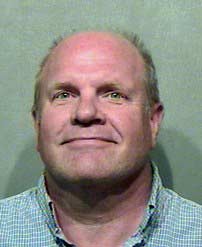
The term “hard-money” lending can be traced to the Great Depression when private individuals started lending money because of the banking crisis, said Leonard Rosen, whose La Jolla-based company, Pitbull Mortgage School, teaches mortgage brokers about hard-money loans.
“No one really knows the reason they used ‘hard money’ as a term. It could be that it was hard to get, hard to find or because it was hard cash,” Rosen said. “I’m not an advocate for hard-money lending. But it’s something that has its place as long as it’s done responsibly. There are some people who should not be in the lending business at all.”
Thomas Hastert, now a former attorney and real estate broker, certainly was one of those people that should not have been in the lending business at all. Hastert had the mortgage company Loan Sense, which was located in Grass Valley off of Brunswick Road.
As you may know by now, Hastert is in jail, having pleaded guilty to 59 felony counts of embezzlement, securities fraud and selling unregistered securities. However, Attorney General Brown had filed 73 criminal charges against Hastert, so by plea bargaining, it was dropped to 59 felony counts with a possible five year jail term instead of eleven years. Hastert is to be sentenced in June.
By the way, Hastert did not make $20 million; most of the money he received from customers he used to make loans with extreme poor judgment, ignoring the law and some obvious intent to commit fraud. Most of the investors’ monies were lost by loaning money with improper loan to value of property. This, along with improper funding of construction loans led to horrific losses to the customers who gave Hastert money to make hard money loans.
This man brazenly deceived investors and borrowers, promising high returns and easy loans, ripping off his customers for his own personal enrichment,” Attorney General Brown said. “Ultimately, this criminal scheme collapsed when many of these loans failed, costing hundreds of people more than $20 million.”
-
Hastert brokered over 270 hard-money loans in Nevada, Sacramento, Sutter, Butte, Placer, and Yolo Counties between September 2004 and September 2007 for real estate development projects. Hard-money loans typically provide high returns for private investors and are secured through collateral such as real estate.
In this case, Hastert secured $20 million from numerous investors, using the funds to broker hard-money loans to borrowers seeking to develop homes on real estate.
In the criminal complaint, Hastert is alleged to have:
“Misled investors. Hastert told investors that borrowers had excellent credit scores and were capable of repaying the loans. This proved to be untrue. Many borrowers had poor credit scores, did not make regular payments on the loans, and held properties that were in foreclosure.
The loans that Hastert brokered were required by law to be placed into a special trust account overseen by a third-party escrow firm. The firm had to verify whether funds being withdrawn by borrowers were being used for construction projects. Despite telling investors he had established such a trust account, Hastert never did, and the money was regularly withdrawn and misused by borrowers with no oversight.
Hastert told investors he would personally oversee the development of the land. In one instance, he was asked by investors to drive them to a particular property that was supposedly under development. Hastert could not locate the property.
Set up fake investors, known as “straw men,” to keep concerned investors at bay. Hastert filed documents with a county recorder’s office saying that his secretary owned a majority interest in the investment, despite the fact that she had never invested a single dollar. If a legitimate investor tried to initiate foreclosure proceedings, Hastert would contend that the supposed majority owner opposed the action.
Embezzled fees. Hastert was entitled to collect a 3% fee on loans he brokered. However, he took all his fees up-front as if the loan were fully funded. In fact, some loans never fully funded, and others took more than a year to fully fund.”
“Those who invest their money with hard-money lenders are taking on significant risk. That’s why they would expect a significant return relative to other investments,” said Stuart Gabriel, a UCLA finance professor and director of the university’s Ziman Center for Real Estate. “If they need to take the property back, there’s legal risk and marketing risk. There can be very significant losses.”
So if you are going to invest in hard money loans, with a promise of high returns, be careful. Give me a call or write if you want some guide lines prior to investing.
Are you kidding…..Tom was just the tip of the iceberg, he was nobody in the big scheme of things….not to defend his actions..but he was really kinda thrown under the bus to try and stop things before they got out of hand and the truth came to light….and it almost worked…almost
My note:
He might not been anyone in the overall scheme of things, but for him being a broker and attorney, he sure hurt a lot of people.
JO
This guy is a first class sleeze bag. The most corrupt person I have ever met in my life. Lock him up and throw away the key.